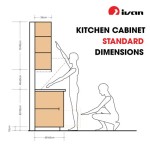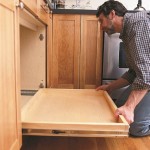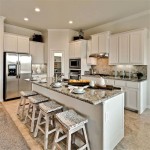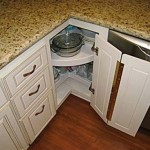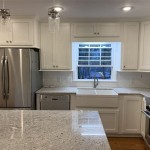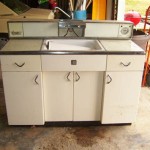Kitchen Cabinet Manufacturing Process
The kitchen cabinet manufacturing process involves a series of steps, from initial design and material selection to final assembly and finishing. This article outlines the typical stages involved in creating high-quality kitchen cabinetry.
Design and Engineering
The process begins with a detailed design phase. This stage considers the kitchen layout, desired functionality, and aesthetic preferences. Computer-aided design (CAD) software is frequently employed to create precise drawings and 3D models. These digital representations allow for accurate measurements and visualizations, ensuring the final product meets the specified requirements. Material selection is also a critical component of this stage, impacting both the cabinet's appearance and durability.
Material Procurement and Preparation
Once the design is finalized, the necessary materials are procured. Common cabinet materials include solid wood, plywood, particleboard, and medium-density fiberboard (MDF). The chosen material undergoes several preparatory steps before fabrication. These steps might include cutting the material to size, sanding surfaces smooth, and applying edge banding to exposed edges. Precise measurements and careful handling are crucial to minimize waste and ensure consistent quality.
Construction of Cabinet Boxes
The core structure of the cabinet, known as the cabinet box, is constructed next. This involves assembling the pre-cut panels using various joinery techniques. Common methods include dowel joints, dovetail joints, and pocket screws. The choice of joinery depends on the material and desired strength of the cabinet. Automated machinery and specialized jigs are often used to ensure accuracy and efficiency during this stage.
Door and Drawer Front Fabrication
Cabinet doors and drawer fronts are typically manufactured separately. They can be made from the same material as the cabinet box or a different material to create visual contrast. The fabrication process often involves intricate detailing, such as routing for decorative profiles or creating raised panel designs. Precision cutting and shaping are essential for achieving a high-quality finish.
Hardware Installation
After the cabinet boxes and doors/drawer fronts are constructed, hardware is installed. This includes hinges, drawer slides, handles, and knobs. Accurate placement of hardware is critical for proper functionality and a polished appearance. Specialized jigs and templates are often used to ensure consistent and precise hardware installation.
Finishing
The finishing stage is crucial for protecting the cabinets and enhancing their aesthetic appeal. This process can involve multiple steps, including sanding, priming, painting, or staining. Various finishing techniques can be applied to achieve different looks, from a sleek, modern lacquer to a rustic, distressed finish. Proper ventilation and controlled environmental conditions are essential during the finishing process to ensure optimal results.
Quality Control and Inspection
Throughout the manufacturing process, quality control checks are implemented at various stages. This includes inspecting materials for defects, verifying measurements, and assessing the quality of assembly and finishing. Rigorous quality control procedures ensure that the final product meets the required standards for durability, functionality, and aesthetics.
Assembly and Packaging
Once all components are finished and inspected, the cabinets are assembled. This involves attaching the doors and drawer fronts to the cabinet boxes and installing any remaining hardware. The assembled cabinets are then carefully packaged to protect them during shipping and handling. Proper packaging is essential to prevent damage and ensure the cabinets arrive at their destination in perfect condition.
Shipping and Installation
The final stage involves shipping the finished cabinets to the customer or designated location. Careful handling and secure transportation are crucial to prevent damage during transit. Upon arrival, professional installers typically handle the installation process, ensuring the cabinets are properly positioned, leveled, and secured. This final step completes the journey from raw materials to a fully functional and aesthetically pleasing kitchen.
Modern Manufacturing Techniques
Modern cabinet manufacturing often incorporates advanced technologies to improve efficiency and precision. Computer Numerical Control (CNC) machining allows for automated cutting, routing, and drilling with high accuracy. Robotics are also increasingly used for tasks such as painting and finishing. These technologies not only enhance production speed but also contribute to consistent quality and reduced material waste.
Sustainable Practices in Cabinet Manufacturing
Growing awareness of environmental concerns has led to the adoption of sustainable practices in cabinet manufacturing. This includes using responsibly sourced wood, minimizing waste through efficient production processes, and utilizing low-VOC finishes. Some manufacturers also offer cabinets made from recycled materials. By incorporating sustainable practices, the industry can minimize its environmental impact and contribute to a more sustainable future.
Customization and Design Flexibility
Modern kitchen cabinet manufacturing offers a high degree of customization and design flexibility. Customers can choose from a wide range of materials, finishes, hardware, and accessories to create cabinets that perfectly match their individual style and needs. Custom sizing and configurations are also often available, allowing for seamless integration into any kitchen layout. This level of customization ensures that homeowners can create a truly unique and personalized kitchen space.

Cabinet Manufacturing Metropolitan Cabinets

Cabinet Manufacturing Metropolitan Cabinets

Cabinet Manufacturing Metropolitan Cabinets

Diagram Of Cabinet Furniture Manufacturing Process Created In Idef0 1 Scientific

Use Of Wood Composite Panels As Substrate For Cabinet Manufacturing Oklahoma State University

How Are Kitchen Cabinets Made Manufacturing Ultimate Guide

Kitchen Cabinet Making Machine Ion Line From China Manufacturer Igolden Cnc

How Are Kitchen Cabinets Made Manufacturing Ultimate Guide

Cabinet Manufacturing Metropolitan Cabinets

How To Install Kitchen Cabinets The Cabinet Manufacturing Process
Related Posts

